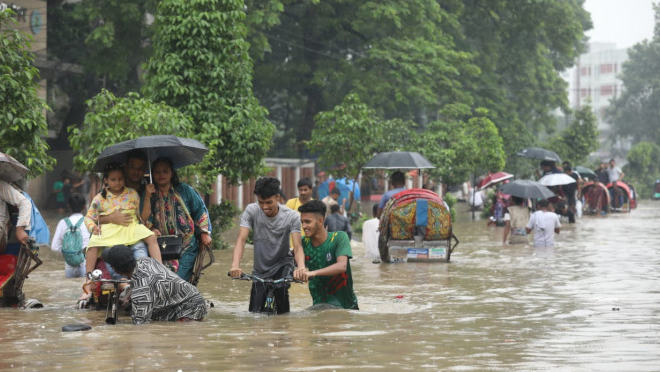Rain, Roads, and Rubbish: Why Dhaka turns into a swimming pool every monsoon
Rain, Roads, and Rubbish: Why Dhaka turns into a swimming pool every monsoon

The other day (a few days back) Dhaka woke up to heavy rainfall. In fact, we are experiencing heavy rainfall all of a sudden nowadays.
For some, that meant cosying up with tea and pakoras. For the rest of us, it meant dusting off our imaginary swimsuit to make it to the office. The city’s streets looked less like roads and more like entry-level versions of Hatirjheel Lake.
It’s tempting, almost too easy, to point fingers at the city corporation for every drop that refuses to drain. Mismanagement, poor planning, clogged canals — they all deserve their fair share of blame. But let us not overlook the uncomfortable truth: we are just equally guilty.
Think about it. Every cigarette butt tossed on the road, every polythene bag thrown into a drain, every random packet of chips or plastic cup “accidentally” left on the sidewalk — it all adds up. Our little acts of convenience become the city’s massive inconvenience. And when the rain pours, Dhaka’s drainage system does not fail because it is lazy — it chokes because it is literally choking on our garbage.
So, what do we do? For starters, let us treat the city as we treat our homes. None of us would throw banana peels in our living room or clog our kitchen sink with shopping bags (at least, I hope not). Yet, the minute we step outside, we seem to think the roads are some magical self-cleaning conveyor belts. They are not.
If each of us committed to not littering, things would improve drastically. Carry a small bag for your trash, hold on to that packet till you find a bin, and resist the urge to test if drains can digest plastic. They cannot. And here’s a radical thought: encourage others, politely, to do the same. Social pressure works wonders in everything from fashion to football, why not cleanliness? Remember, our collective action can bring about significant change.
Of course, this does not let the authorities off the hook. They need better drainage systems, stricter enforcement, and more thoughtful urban planning. We need to hold them accountable for these improvements. Imagine if citizens and city officials teamed up, Dhaka could become a place where umbrellas are just for the rain, not for navigating flooded streets.
At the end of the day, it is simple: if we want to stop swimming to work every monsoon, we need to stop drowning our city in trash. Dhaka does not need more canals to carry waste.
All that the capital needs is a little bit of self-awareness among its residents so that they also act responsibly to keep the city clean.

Shafiq R Bhuiyan is a storyteller who examines the intersection of social progress, effective communication, cultural development, and corporate social responsibility while sharing insights to inspire change.
Disclaimer: The views and opinions expressed in this article are those of the author and do not necessarily reflect the opinions and views of The Business Standard.


